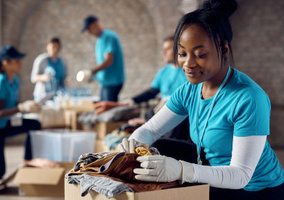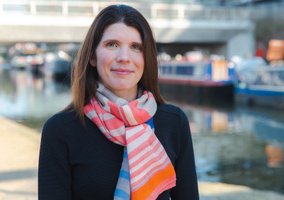The number of people volunteering in England fell further last year despite most restrictions to curb the spread of Covid-19 ending, according to new government figures.
According to the latest Community Life Survey, the proportion of adults volunteering either formally or informally, monthly or annually, all fell to their lowest levels since it began collecting data in 2013-14.
In 2021-22, 16% of adults said they took part in formal volunteering at least once a month and 27% once a year, compared to 17% and 30% respectively the year before.
Some 26% of respondents said they had informally volunteered in the past month and 46% in 2021-22 overall, compared to 33% (the highest ever recorded by the survey) and 54% respectively the year prior.
Meanwhile, more respondents (66%) said they had recently given money to charity than a year earlier.
The Department for Culture, Media and Sport’s (DCMS) survey ran from October 2021 to September 2022 and was completed by 10,126 adults aged 16 and older in England.
The 2021-22 Community Life Survey covered a period when some Covid-19 restrictions were still in place, but there were fewer restrictions than in the previous two years.
Least deprived show higher volunteer participation
In 2020-21 respondents in the age group 25-34 showed lower participation in volunteering at least once a month compared to respondents in every other age group for formal volunteering.
Respondents identifying as being from an Asian ethnic group showed lower participation in formal volunteering at least once a month than respondents identifying as from a mixed or white ethnic group.
Participation rates across ethnic groups were consistent with those in 2020-21, but lower in those from a White ethnic group compared to 2019-20.
Formal volunteering at least once a month was higher for those economically inactive, 21%, compared to employed respondents, 15%.
Those living in rural areas showed higher participation in volunteering than those in urban areas and those from the least deprived areas showed higher participation than those from the most deprived areas, 22% as compared to 10%.
Rates of informal volunteering at least once a month were higher for those who identified as female than male, 30% as compared to 22%.
Those with a long-term limiting illness or disability participated more in informal volunteering in the last month than those without, 31% vs 25%.
Charitable giving
In 2021-22, 66% of respondents said they had given money to charitable causes in the last four weeks, an increase from 2020/21 when the figure was 63%.
This is, however, a decrease from 2019-20 when the figure was 75% and lower still than 2013-14 rate when it was 82%.
Respondents who identified as female were more likely than those who identified as male to have given to charity in the last four weeks, 72% vs 61%.
The average amount given was £27, excluding those who donated £300 or more and of those who gave to charitable causes, 21% gave to medical research, in line with 2020-21 rates.
The survey found 19% gave to overseas aid/disaster relief, an increase of 14% giving to this cause in 2020-21. Moreover, 18% gave to hospitals and hospices, lower than rates of giving to this area in 2020-21 at 24%.
When respondents were asked what would either encourage them to start giving to charitable causes, or to increase the amount they currently donate 34% said having more money.
Moreover, 24% said having confidence that the charity or organisation uses the money effectively, 16% said knowing that their money was going to be spent locally and 38% said none of the options listed would encourage them to start giving or to give more.
CIoF: ‘People give when they are asked’
Daniel Fluskey, director of policy and communications at the Chartered Institute of Fundraising (CIoF), said: “I think it’s really important to look at this from a fundraising perspective and understand what people do, alongside what they say.
“Of course there is a relationship between economic challenge and donations – the level of household wealth is a pretty good indicator of how much people will give.
“The key thing missing here in terms of understanding what is likely to influence whether people give or not, is the impact of fundraising – we should always remember that people give when they are asked, and focus on the quality of those fundraising appeals and activity.
“In times of economic challenge, it’s more important than ever that charities invest and support fundraising capacity, skills, activity, and people. We cannot control inflation, but we can make sure that people continue to be asked, and asked well.”
Meanwhile, a DCMS spokesperson said the government was committed to encouraging and supporting volunteering in England and that it was investing £7m into making volunteering more inclusive offering opportunities in the arts, sport, youth and heritage sectors.
“We are also working closely with partners on the sector’s ten-year Vision for Volunteering strategy to help get even more people involved in the long-term,” they said.
'These results are a clear warning'
NCVO senior policy and influencing advisor, Catherine Goodall, said: “Volunteering is vital for our wellbeing and creates strong communities – it’s great to see that people are giving their time to causes they care about. But these results are a clear warning that there are ongoing challenges facing volunteering. We know that many volunteers are experiencing burnout after the pandemic, and charities are telling us about challenges recruiting and retaining volunteers.
“2023 will be a big year for volunteering. We’ll be celebrating their contributions during Volunteers’ Week, encouraging volunteering through the Big Help Out, and creating positive changes over the next decade through the Vision for Volunteering.
“The voluntary sector, government and employers all have a role to play in supporting people to give their time and have a good experience.”
Related Articles












